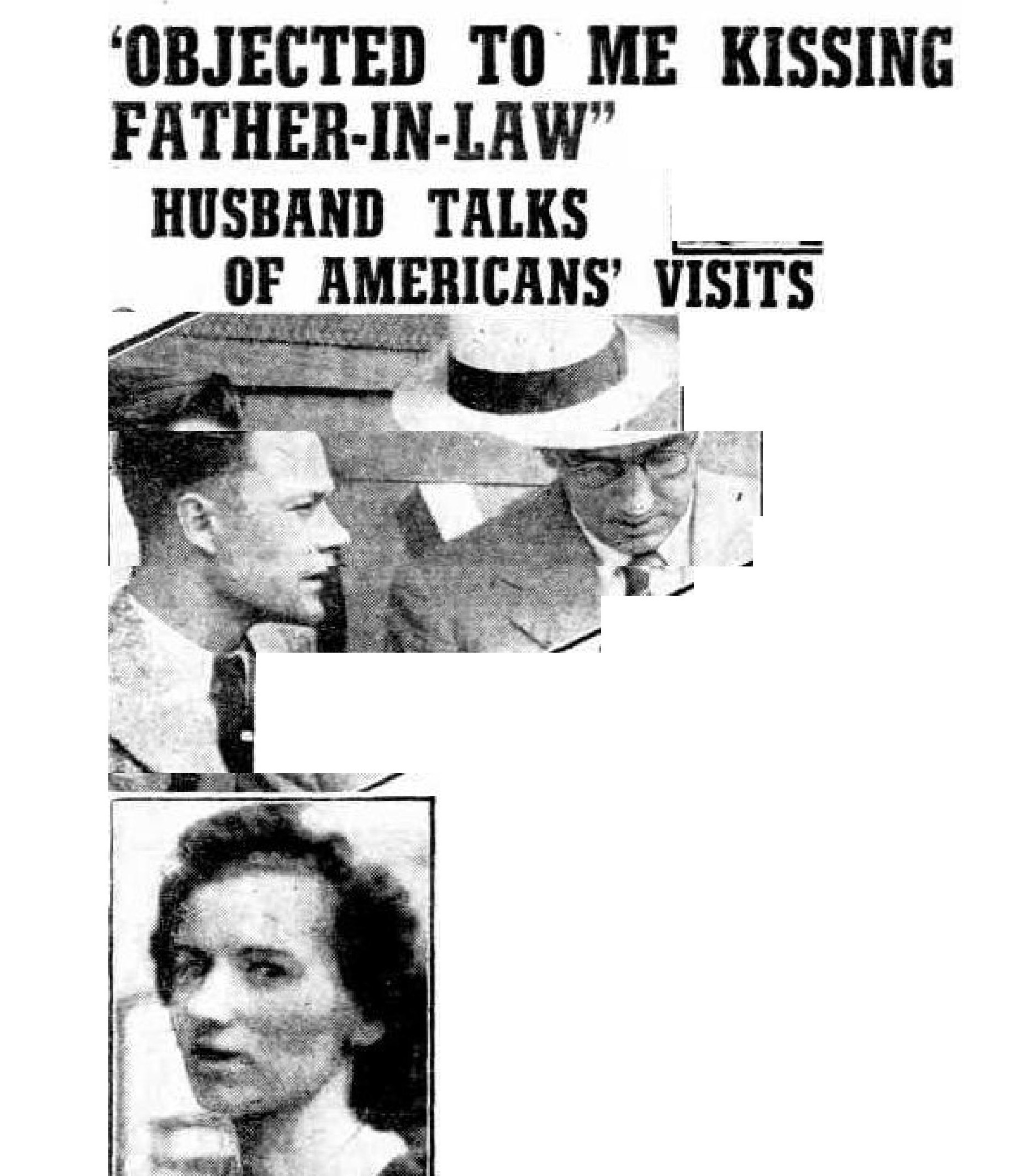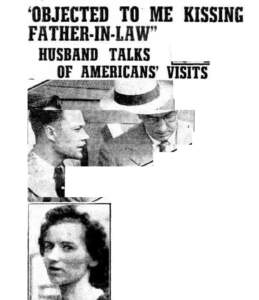“OBJECTED TO ME KISSING FATHER-IN-LAW”. HUSBAND TALKS OF AMERICANS’ VISITS
Roy Ernest Hardy (left) and his wife, Dulcie Olive Hardy (below), who made allegations, and countered other allegations with further allegations, in the course of the lady’s prosecution of a suit in Brisbane Summons Court last week for maintenance of herself and countered other their four-year-old child. Mrs. Hardy said her husband objected to her kissing her father-in-law. With Hardy in top photo is his counsel, Mr. L. Brown (at right).
The private lives of Dulcie Olive Hardy and Roy Ernest Hardy, lately of Beaudesert but more recently of Brisbane, were put through the matrimonial wringer in Brisbane Summons Court last week, when the lady sued the husband for maintenance of herself and their four-year-old daughter, Lenore Dorothy. The extraordinary allegation was made by Mrs. Hardy that her husband was so frightfully jealous and suspicious that he even objected to her kissing his father! Hardy, on the other hand, countered his wife’s charges by reciting a number of alleged happenings which, he considered, gave him ample cause for his suspicion.
Mrs. Hardy, of Ipswich Road, Moorooka, said that she was married in April, 1937, and went to live with her husband at Beaudesert. For the first few years everything in the matrimonial garden bloomed grandly, but then Hardy developed a suspicious mind.
“Even in the best of moods, he was accusing me of something,” she said. ‘If I went to a dance, he accused me of acting wrongly with a man. He wanted to know every detail of what I did while out, from the time I left the house, until I returned.”
Mrs. Hardy went on that, in the early days of their marriage, she and her husband went to dances together. However, it was not until two and a half years after the birth of her daughter that she again went to a dance.
Then she went to dances twice a week, but always made sure that the child was asleep before she left home.
They came to Brisbane about June last year, and lived in a room with friends of her husband. Whereas in Beaudesert he had paid her an allowance of £3 weekly, on arrival in Brisbane he “cut it out”, and she had to ask him for every thing she wanted, even to 3d. for an ice cream for the child.
After they had been living with, his friends at Norman Park for about a month, he went away, saying that he was going to get his car repaired. He was away for over a fortnight before he telephoned, and said that he did not know when he would be back. He sent her £2/10/- weekly.
Two or three months later he telephoned her to say he had found a house and demanded that she take it. When she said that she would like to see it, he told her that if she did not take it he would cut out her money altogether.
Next day, continued Mrs. Hardy, she went to look at the house. “I found it in the middle of a timber yard, opposite where my husband works,” said Mrs. Hardy. “The house was in a dreadful condition, and when I remonstrated with him about it, he told me that it would lower my pride, and that he had no intention of looking for another place.”
Finally, she took the place, and while they were moving her husband said that he was going to bring some of his friends along. She said she would be too ashamed of the place, and he grabbed her and just about tore all the clothes off her, Mrs. Hardy continued.
She had a great deal of trouble with the old fuel stove, and her husband, although they had an electric stove of their own, refused to connect it up. He was an electrician by trade, employed by Brett and Co., sawmillers.
Complaining about the meals she prepared, her husband began having his meals at his parents’ home, she said. Later, it reached the stage that he would not come home until after midnight, would sleep in a separate room, and would leave again about 7:30 a.m.
Just before Christmas, she went to her mother’s home for a week-end, and arrived back at her own home at 6 pjn; on the Sunday. She foand the place in a dreadful state; clothes were scattered everywhere, the carpet had gone from the dining-room, all crystal and crockery vanished, and the refrigerator and electric stove had been removed.
She returned to her parents’ home that night, and saw her husband next morning. She asked for her week’s allowance, but he did not answer her. She returned to her parents’ home altogether.
STATE OF NERVES
To Mr. L. Brown (for the hus band), Mrs. Hardy said- that she was not willing to effect a reconcili ation; her nerves were in such a state that she could not do so.
Her husband used- to go out three nights a week, while she only went Out two. In addition, he was away at week-ends.. Whoever was at home minded the child.
She also denied that she had ever been drunk. She only had had liquor in the company of her husband.
It was not true that an American had -spent the night at her home while her husband was away fishing. She also denied saying to her hus band that the whole trouble was that he was too narrow-minded.
‘My husband received this’ advice from a solicitor: ‘Never live with a woman unless she gives her best. Get rid of her,” said Mrs. Hardy. ‘After that, he began hounding me.”
AMERICANS ARRIVED
Hardy, in his evidence, said that he had been to dances about five times in as many years, while his wife had been two and three times weeky [sic].
The Americans arrived in the Beau desert district in 1943, he said, and his wife attended dances at which they were present.
One night he returned from, a lodge meeting at about 10.30 and saw some empty whisky bottles on ‘ the kitchen table, together with two glasses and several cigarettes. He went out on to the sleep-out and found his wife on a bed, under the influence of liquor. In the lounge were two cartons of American cigarettes and some candy.
Next morning, he asked his. wife what had happened and she told him that ‘Barney’ had visited the house, thinking they were- both home. She and Barney had had some drinks, but she had taken hers too quickly.
On another occasion, said Hardy, he returned home from a fishing trip at 6 a.m. one Monday, and found his wife and an American named John Carbone sitting in the kitchen.
He remarked to the American that he was a -rather early visitor and Mrs. Hardy said, ‘We- have been sitting up all night waiting to see your catch of fish. I was terribly worried about you.’
At lunch-time that day, Hardy said to his wife, ‘That was a nice thing, having a Yank here all night,’ and she replied, ‘He is a decent chap and you are too narrow-minded.’
Hardy detailed other occasions on which he had seen his wife -in the company of Americans, and also of her drinking. On one occasion he had found five packets of certain articles in a drawer of the duchess. His wife had told him she got them from an American.
In March last, he secured a posi tion in Brisbane and came down, leaving his wife in Beaudesert, while he secured a house here. One night he drove up to Beaudesert and arrived there in heavy rain. He found the front gate locked.
He jumped the fence and rang the front door bell. His wife told him he could not come through the house as he was too wet.
Hardy said he went around to wards the back door, and was half way round when he looked back and saw an American jump over the front fence. Later, he asked his wife who it was and she said, ‘Carl Lauber.’
After an argument, Hardy jumped into his car and returned to Brisbane, he said. Subsequently, he secured a room for his wife and she came to Brisbane.
Hardy denied telling his wife, that the house at Windsor would lower her pride. He did not tear her clothes off. All he did was to take her by the shoulders and give her a good shaking.
Regarding her complaint about the electric stove Hardy said that it would take two full days’ work to connect it.
He had been too busy at the mill to do that.
Following an argument when he had interfered with her beating the child with a stick, she had told him that she would not cook any more for him, he stated. And she had not done so, he added.
To Mr. Hempenstall (for the wife) Hardy said that the offer of reconciliation made in a letter by him to his wife on January 12 did not stand now. He had changed his mind after hearing his wife’s declaration in court that she would not live with him again.
Hardy admitted that he had been drunk in his wife’s company and that he swore at times.
He had not told the Americans, Lauber and Carbone, to keep away from’ the house, because after tha particular incidents he had quoted, they had not been to his home white he was there. -His wife, however, had told him that they had been there while he was absent.
Hardy admitted that at Beau desert he bad gone out on an aver age of two nights weekly, and occa sionally for week-end fishing trips, during which his wife and child were alone at home.
His wife used bad language during rages of temper, said Hardy.
He was 29 years of age, he said. He was never a member of any of tha Services. He worked at Beaudesert throughout the war.
Hardy had been in the witness box for over three hours when the hear ing was adjourned until Thursday next.
‘Kathleen Mavourneen,’ remarked the magistrate, Mr. A. H. O’Kelly SM., when fixing the -third day of hearing.
Mr. J. F. Hempenscall appeared for the wife: Mr. L. Brown for the husband
From Truth, Sunday 27 January 1946, page 15.
Image: Newspaper image from National Library of Australia Trove.


